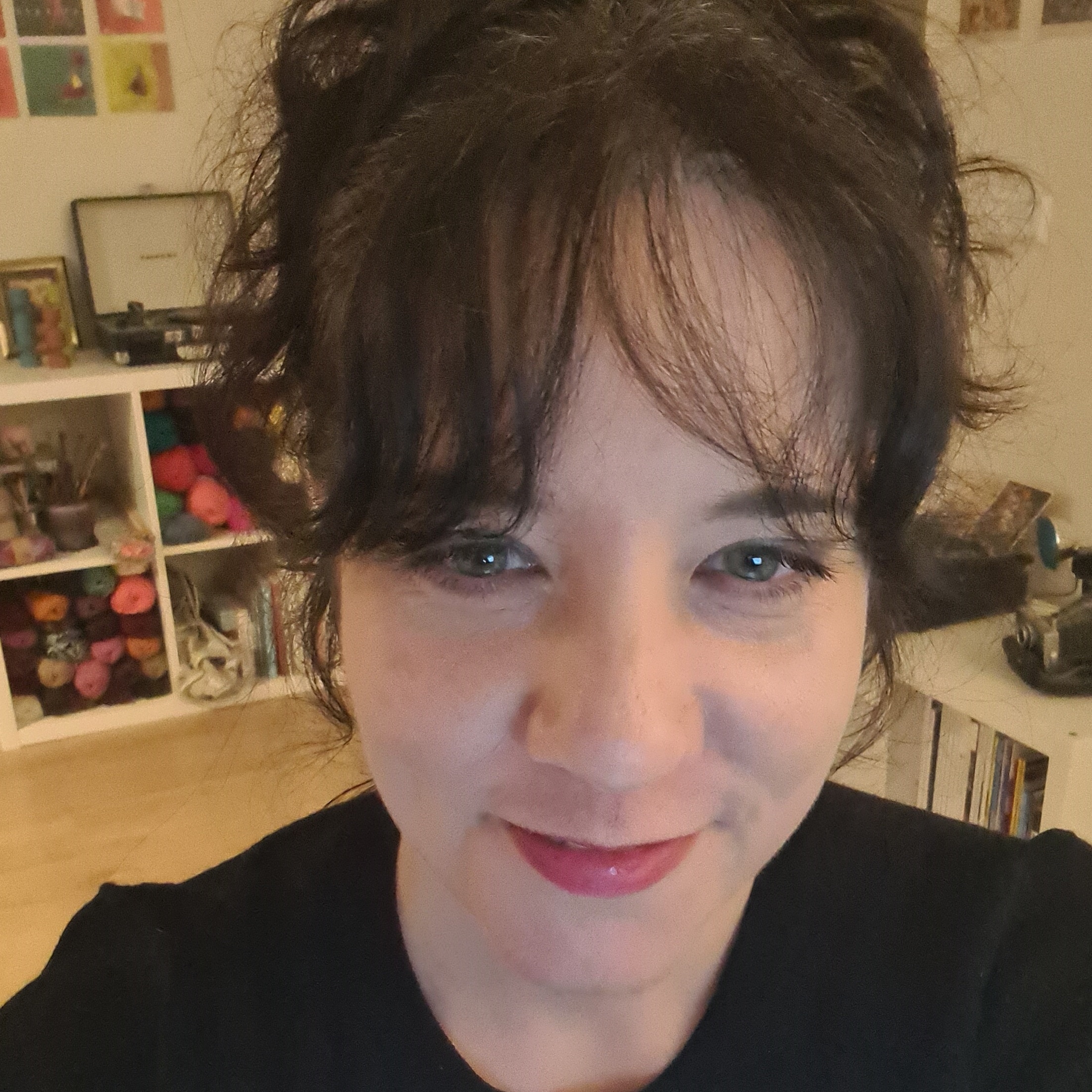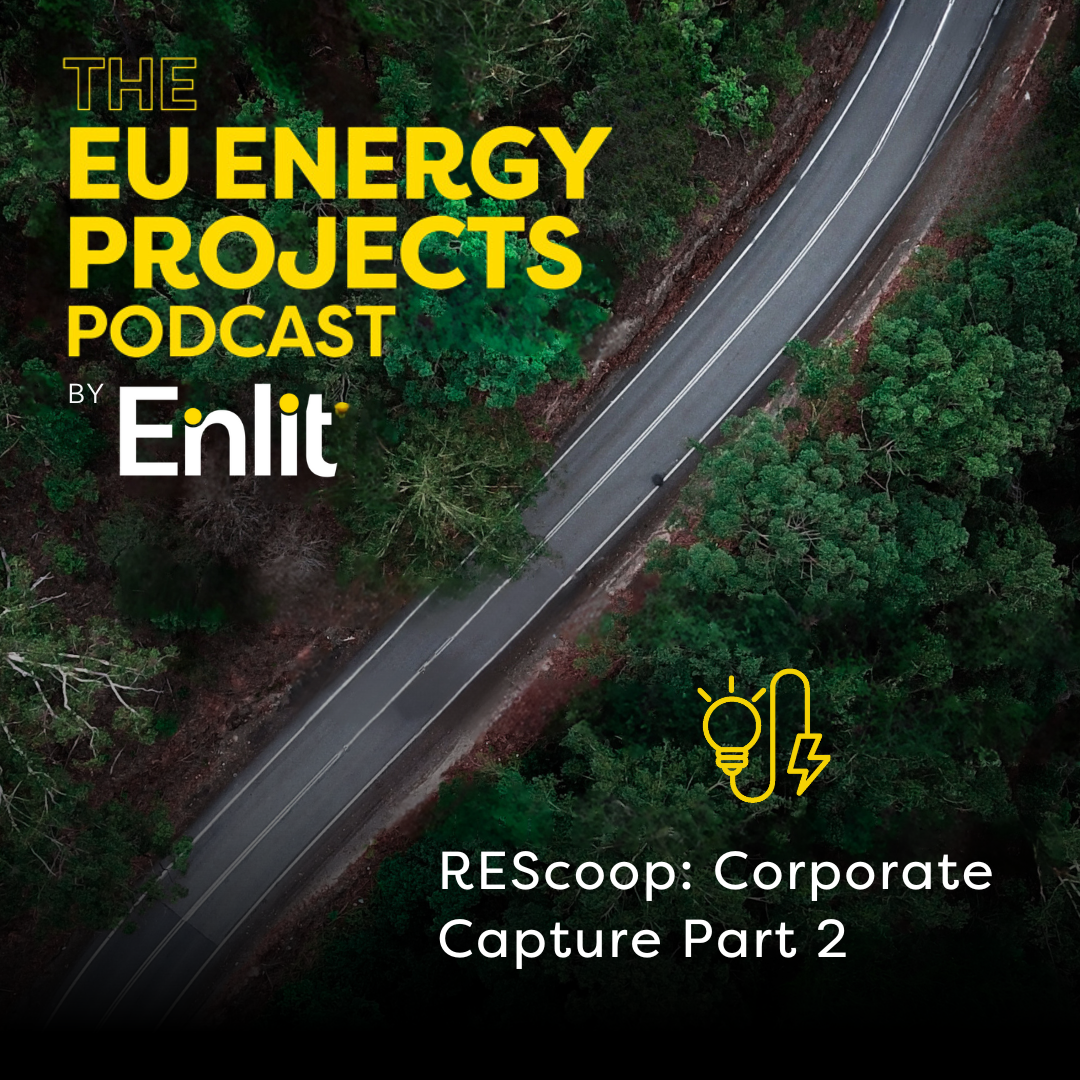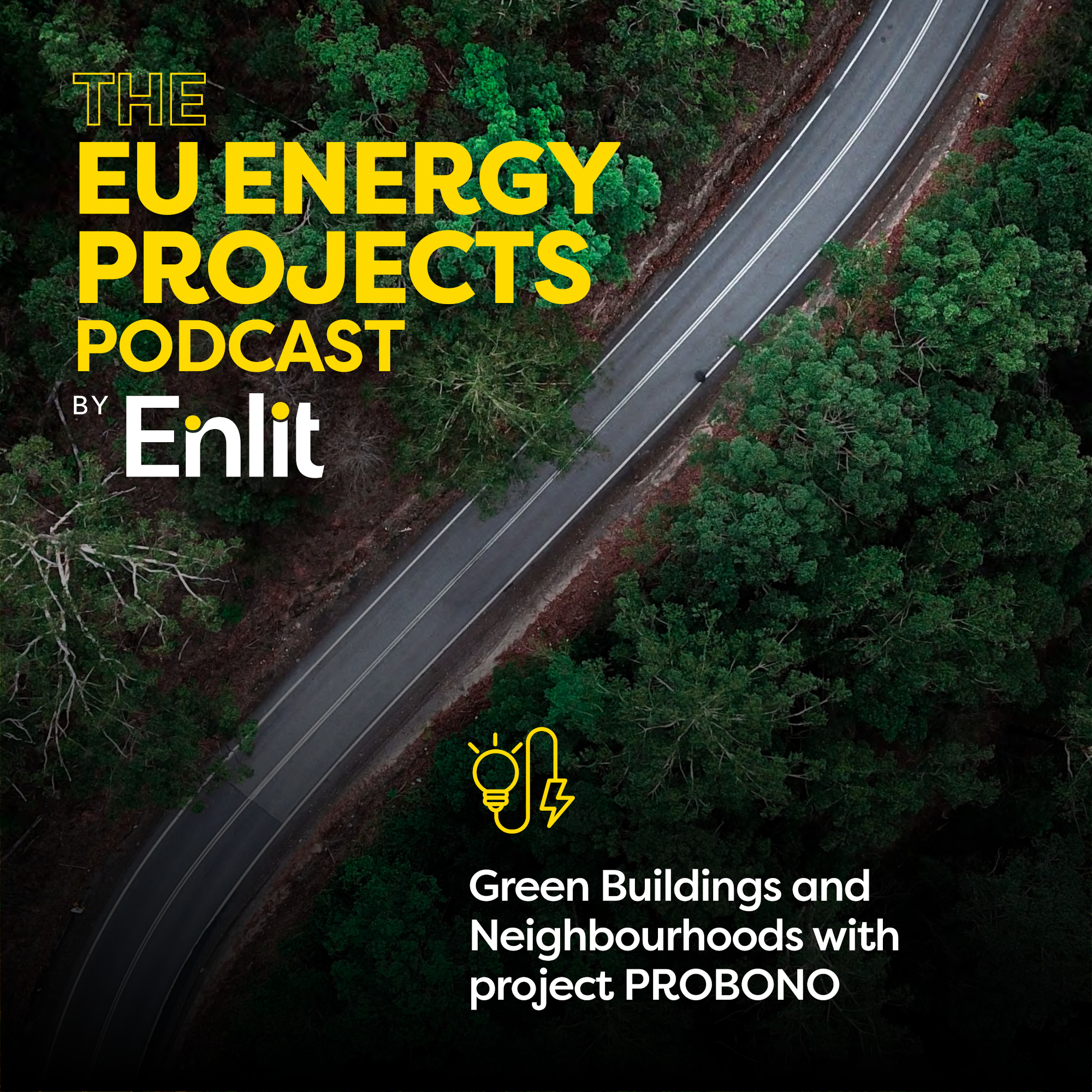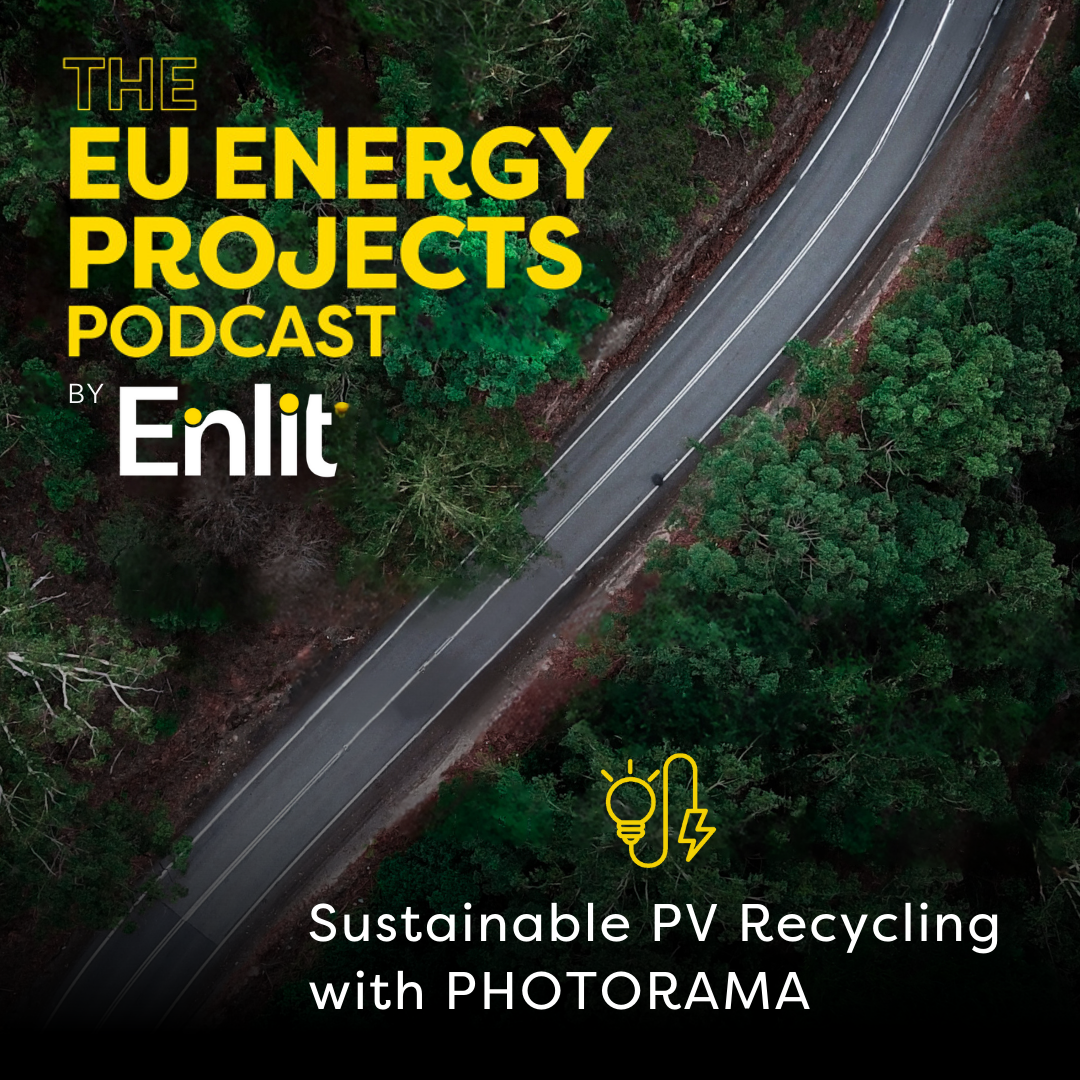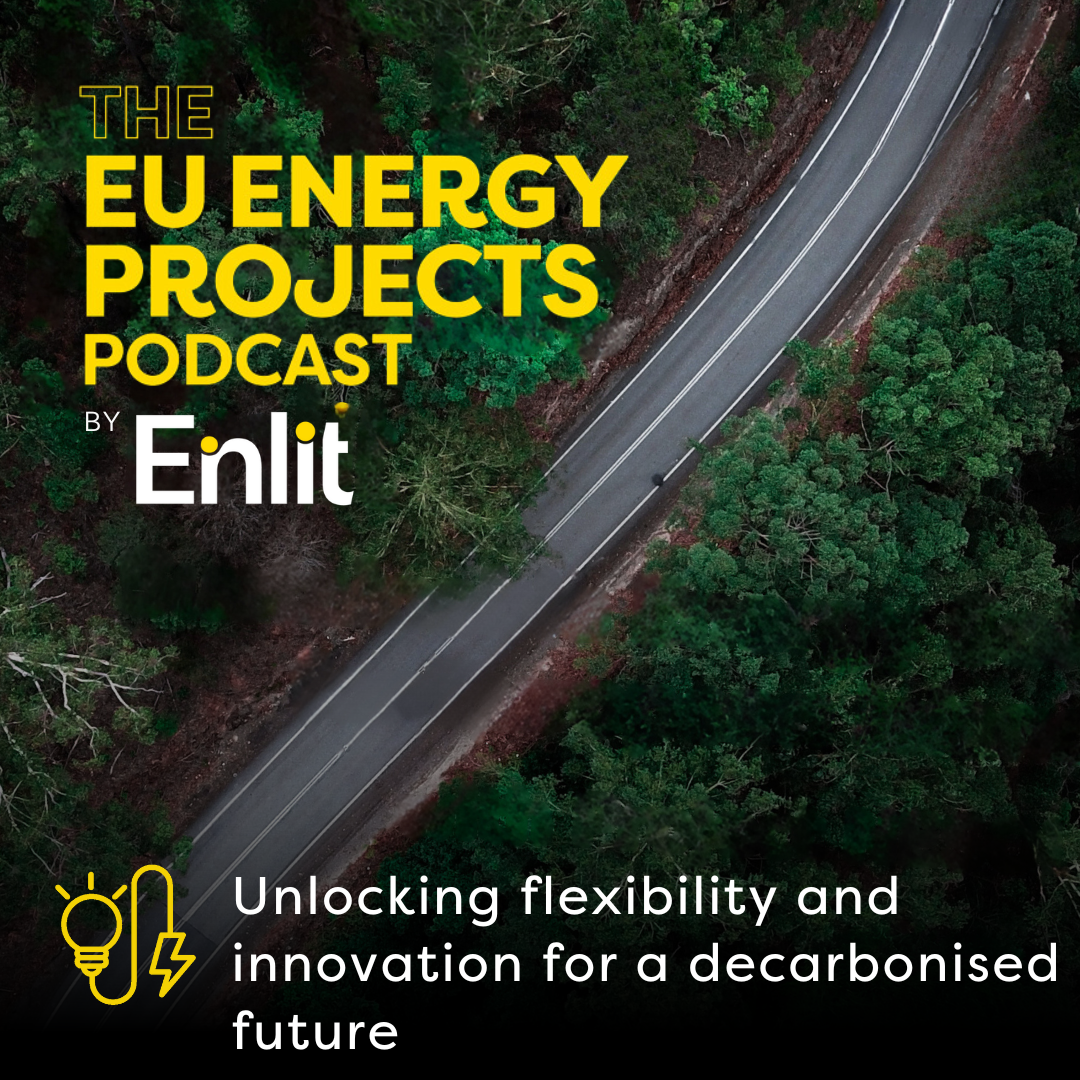Episode Transcript
[00:00:10] Speaker A: Welcome to the EU Energy Projects podcast, a podcast series from Enlighten France focusing on the clean energy transition for the European Union and the EU Commission funded energy projects that will help us achieve it. My name is Areti Daradimu. I am the editor of the EU Energy Projects podcast and your host in part two of our two episode series on corporate capture and true democracy in energy communities. We're joined by Jean Pierre Vanlin and Sivard Zomer from risk group member Energizaman. Energizamen is the national umbrella and interest group of energy cooperatives in the Netherlands. Guys, thank you for joining us. Could you please elaborate on the role of Energizamante in.
[00:00:59] Speaker B: Susan is a federation of about 700 energy communities in the Netherlands.
It's a merger of different federation of energy Community cooperatives on national level from 2019. So every time when energy communities had an idea or they wanted to create a service, they set up a new cooperative of cooperatives. And by the time in 2019, there were about seven cooperatives of cooperatives on a national scale, and we merge them together. And we are now a federation that delivers all kinds of services to our members, which are energy communities most of all. We do the lobby and the advocacy for our members on a national level, but we also create access to capital. We got our own it system so people can collect money from their own individual members, but also do the membership administration very efficiently and effectively.
And we have our own academy to train energy communities.
[00:02:06] Speaker A: Okay, so you mentioned three things that are quite important. First of all, I would like to stop in the lobbying and policy part. You said you do that nationwide. So it is with a dutch government, I would assume. What happens with the EU Commission? You have rescoup to do that for you.
[00:02:24] Speaker B: Yes. So we're also founder of Rescoup. I'm in the board of Rescope, and there's a constant interaction of, if we can't get stuff done on a national level, we first start lobbying on a european level. For example, the definition of energy communities. We started on a european level. Now, six years later, the dutch government is finally forced to put it into law. And now we lobby on a national level to get it in the dutch law. And everything that wasn't put right specifically on a european level, we try to change now on a national level to make sure we got the perfect definition in the dutch law.
[00:03:10] Speaker A: Can you be a little bit more specific? What are the things you're lobbying about on a national level?
[00:03:15] Speaker B: On a national level, we specifically lobby for the word democracy. In a definition, when we were lobbying on a european level, we asked to put the seven cooperative principles in the definition of energy communities. But in the whole mess and chaos of EU regulation, the word democracy fell out. If you read the memorandum under it, it clearly states it's for citizens who work together in democratic organizations. But it's not in the definition. And in the case of the Netherlands, we like to repair that, because what we've seen is that democratic rule is the best way to make sure it's not. Yeah, you won't have corporate capture. Nobody will put money in an energy community if there's one member, one vote.
I mean, not one private party will put all his money in an energy community when there's one member, one vote. So it really helps keeping it for something that it was always intended to be for citizens.
[00:04:28] Speaker A: Did you know that enlit has another podcast? The Energy Transitions podcast is a broad ranging bi weekly podcast about the people accelerating the energy transition in Europe and beyond. You can find it on Spotify, Apple, or wherever you enjoy your podcasts.
So, speaking about corporate capture, do you have any examples? Was your federation, let's say, a victim within quotation marks of corporate capture? And how did you handle it?
[00:05:00] Speaker B: No, we've never been a victim. We are a strong federation of a lot of energy communities. But we have seen a subsidy that we specifically created for energy communities, a feed in tariff for energy communities, that organizations tried to use that subsidy by creating fake energy communities. But there, too, we put the rule in that there's one member, one vote, and there's almost no misuse of it. But what we do see, but they can't use the legal forms. But we do see that private companies take over our language where normal consumers can't really distinguish between private for commercial organizations and energy communities because they basically use the same language, propose the same things, but it's completely different. So we're now also working together with the dutch government on setting up norms so we can have specific certificates for energy communities in the future. And then you can be a certified energy community that does energy sharing and sells energy for a cost price instead of a commercial company that puts a couple of consumers together virtually and say you're getting cost price while they're just getting the market price with some discount.
[00:06:31] Speaker A: Is the lobby underway?
[00:06:33] Speaker B: Well, we've been lobbying it for two years already. At the moment, the dutch government is making the energy law.
It will be in parliament next week. And we specifically made an amendment, or we suggested an amendment to parliament members to add the word democratic in the Netherlands? In the Netherlands, we think it's very, very important. We see the energy communities as the way we control our waterways. These are also separate democratic organizations that control our waterways. So we would like to see that the energy communities that control the energy flows and another specific social need are also democratic organizations.
[00:07:18] Speaker A: This kind of omissions happen often, like with the word democracy, or is it something that just happened once?
[00:07:25] Speaker B: Yeah, european regulations are one omission after the other.
That's why nobody understands what is actually meant, because all the inputs of a thousand stakeholders are being put together into unreadable sentences. And then people on national level try to figure out what was actually meant, and then you got all kinds of different interpretations on how you should do it. You see this now on energy sharing, but also on the implementation of energy communities throughout 27 countries.
I've been asked this question a lot of times, but there's no other way to do it. We can ask two guys or two women to write the regulations and have no input whatsoever. Then probably you'll have the perfect text, but nobody agrees with it.
And now we have very messy texts, but a lot of people feel like they've been heard and agree with the text. So it's a concession we have to make in a democracy, I guess that.
[00:08:32] Speaker A: Is correct, and that is perhaps the very definition of democracy. Savart, or one of them. The second part that we discussed regarding the federation is that of finance, like you said. So how do you help energy communities finance themselves or get funding?
[00:08:50] Speaker B: Yeah, so it's not just finances. So what is very specific also for the ACE project is the combination of knowledge and finance. We've, from an early on stage, we adapted the goal that no community energy project can fail because of the lack of finance or knowledge.
The main issue is that finance and knowledge aren't at the right time, at the right place. So our goal is to make sure that knowledge is on the local level, at the right time, in the right place. So we started setting up what we call like a fund desk to create access to capital, to make sure that there's capital at the right time, at the right place. So we also have. We don't have one size fits all fund. We have different kind of funds that match the kind of organizations, but also the phase that they're in. So we have a specific fund for when you already developed your project, but it's too small to go to the bank. So we have a realization fund, but before that you need to have development costs. So we also have a development, a community energy development fund to make sure you go through the development phase. We're now lobbying for a startup fund, so you get sort of a subsidy to set up your organization before you receive the millions for the development fund. So this way we create what we call a bicycle track. So in the Netherlands we have bicycle tracks. There's no obstacles in between. You don't have to go around about, you're safeguarded from traffic. And that's what we aim for in development of energy communities. They get the capital, but we always negotiate that. We don't just receive capital, send it through to our members. There's always a margin for us energy sam, to make sure we develop the knowledge that is needed. So we standardize the contracts, we give trainings, we create webinars. If you don't do this, then you will be giving a lot of money to inexperienced organizations, which will be a big risk for the public appearances of these organizations. So these combinations always need to be made.
[00:11:15] Speaker A: That makes total sense. But insisting a little bit on the funding. The initial funding that you mentioned comes from the dutch government, the EU commission, the people themselves. Crowdfunding, all the above.
[00:11:32] Speaker B: It's all the above, but at the right time, at the right stage. So we start with government money.
Once we've got that startup fund, it'll be subsidy. You don't have to pay it back, the risk is way too high. Or to think that you get that money back, you just build up your organization. The next step is development money.
There you can see that there will be a project and the project will reach financial close, which means you get money from the bank, and then you can pay back that loan with a bonus. So the fund becomes revolving. That is also dutch government money.
And we set that up because a lot of private developers said, don't worry about it, we will pay the development costs for you, but we will own the project, and then you can buy it back after financial close. And then some energy community thought, oh, that's a good deal, I don't have any risk, but I still get the assets at the end. And then when they had the assets, the permits, with a wonderful story saying like, this is energy community, they, instead of asking the development money back with a small bonus, they asked the net present value of the project. So all the profits in the future, they would make the energy community pray all the profits of the future to buy the assets back. And then we thought, okay, this is how we're, this is corporate capture, this is how we need to solve this. And then we got government money in that can take the risk. And make sure there's a revolving fund for energy communities.
[00:13:18] Speaker A: Perfect. Sivad, what are the seven cooperative principles?
[00:13:22] Speaker B: The first one is open and voluntary membership, which means everybody can participate, but we're not going to force anybody to participate. The second one is democratic rule of the members, which means the power isn't distributed by the amount of capital you put in, but the amount of power is distributed by the members themselves.
Third is economic participation of the members.
It means the members themselves put the money in. If somebody else puts the money in, they will have the power.
And then you come to the fourth principle, which is autonomy and independence. Without economic participation, you'll never reach autonomy and independence. Or you can have a fake energy community, like they have in Belgium, where other companies do the financing, but the members can just put some extra money in, but have nothing to say. The fifth is you can make sure there's education not only for your members, but also about the cooperative principles, about the philosophy, economic theory behind cooperatives, but for the members. It's important because the company is owned by the members.
If only a small group of members have the education on how the statutes work, how decisions are made, how the company functions, you can't really have good democratic voting, so you get an exclusive group. So you focus on the education of your members, on their rights and obligations. And the 6th one is cooperation between cooperatives. It means we're not competitors. All our members, they don't compete with each other, but they help each other. And we make sure we have strong cooperatives on a local level. That's our goal. So they can help other cooperatives. And that makes us a lot, a lot stronger as a sector, as a whole. And finally is when you have a company owned by members of the community, they also have a concern for the community, but it isn't obvious all the time. So it's part of the principles, part of your profits you use to, not only for the benefit of your members, but also rather for the benefit of the community, where they live in. And if you follow those seven principles, you'll have a very sustainable company, because it forces you to create a balance between the people, your members, the profits, the economic participation, and the planet, the community, and the balance between people. Planet profit is the definition of sustainability.
So there you have it.
[00:16:16] Speaker A: Thank you very much.
Jean Pierre Tanislas told me that you are more into the. You're responsible for the community investment team at Energi Xaman, and, well, basically, you're more the finance guy.
[00:16:31] Speaker C: I'm responsible for the financing solutions. So one of the things that Siwad mentioned is that we remove barriers for local energy communities. One of them is finance, financing. Their ideas, their projects, their organizations. So I head up the team that can provide financing solutions. And we have a number of financing solutions, all depending on the stage in which the cooperative or the project finds itself. And so that's what I do.
[00:17:09] Speaker A: Can you give us an example from the beginning till the ending of one.
[00:17:13] Speaker C: Project, the finance side of a project? Sure. When a cooperative has a good idea, they sit down and they develop a vision of what they would like to do, be it a solar pv installation on a roof, or perhaps more ambitiously, a number of wind turbines on the outskirts of their community.
When they develop their ideas, they will incur cost, cost to higher specialists who can help plan, prepare, design, calculate also the cost of gaining local support, local permissions from the municipality. Now those costs can get very high. The more ambitious the goals are, the more complex the installations and solutions, and the more costly the initial stage can be. We call that the development stage. Before that, as Siwad mentioned, there's a startup phase, but we have a specific fund for the development phase of plans and projects. And the risks in that phase are very high. Sometimes when you start with writing your idea on the back of an envelope, you have no idea whether it will actually work. We have a fund, in fact, since last week, we have two funds that will allow you to lend money for this high risk development stage. Whilst you don't know whether the project will actually work, whether it will be a viable project, whether it will achieve financial close, you can still borrow money from the two development funds that we have. One is specific for electricity generation projects. And the new one, like I said, since last week, is more for district heating projects.
[00:19:07] Speaker A: So a project can come to you, or a community can come to you from the beginning, when it's just an idea, and there's a number of people, I would assume involved, or can just one person with one idea come to you also?
[00:19:23] Speaker C: No. You have to have taken initial steps to become a cooperative.
Sam is for the cooperative movement. So the people who can apply for a loan, they have organized themselves into a cooperative, and we do checks on whether you are a genuine cooperative, by checking their statutes, by checking the notes from their general assembly meetings, etcetera, etcetera. So this is for cooperatives.
[00:19:55] Speaker A: Do you have an example, perhaps, if it ever happened, of a business, let's say, that tried to create a bogus cooperative and come to you for funding?
[00:20:05] Speaker C: Yes.
That's a tricky question. We don't want to, but yes, I.
[00:20:12] Speaker A: Mean, cooperative, we don't have to point fingers. Just describe the story. Give us the story. Just describe the situation to us.
[00:20:20] Speaker C: Well, one of the things that we do fund is knowledge sharing. Knowledge buildup, knowledge sharing. It's very important. So we do financing and knowledge sharing. So we had an instance where five entrepreneurs together, put together a cooperative and came to us and said, we would like to expand our knowledge. We are a cooperative. Can we have some funding? But when we looked into it a bit deeper, each five of the members, only five members of this cooperative were actually self employed project developers. So we didn't see the public benefit or the community benefit of that particular cooperative. So they couldn't apply for a loan.
[00:21:05] Speaker A: There are a lot of traps in the legislation and in the policy, or let's say openings for misinterpretation and for companies to try to serve or take advantage of the situation. Is that right or not?
[00:21:20] Speaker C: Well, I wouldn't say that it's, you know, that kind of practice is rife.
99% of the cases that we deal with are genuine, community based, community led, mostly volunteers who have a real energy transition purpose in mind, who want to contribute. I would say that 99% of the organizations that we are in touch with, we like to support. Now, maybe that's because we've made a big point in defining energy communities, as we all want them to be.
But the biggest corporate capture, or the problems we incur when, is when cooperatives, sort of commercial project developers, have a land position and they allow a local community to join their project in order to receive the necessary permits from the local municipality, but then make the local community pay for the development cost, plus a premium. So you're actually, you're buying off at a market price the installation that you really should have developed yourself as the local community. But, you know, we are also, we are very aware of that, of that practice. And don't get us wrong, there's nothing wrong with commercial companies, as long as they join a complementary role.
There's nothing wrong with making a profit. There's nothing wrong with making money.
We need money. Local energy cooperatives also need money, but it's not the meaning of life, it's the oxygen. You need money to develop your project.
In the development phase, risks are very high, and that means that some projects fail.
Now, we have built in the supply of funding to high risk development projects. We have built in various milestones that help us to reduce risk at the very early stage of development, the risks are highest, and you can assume that maybe two out of three projects actually don't materialize. But what we do is we lend small amounts of money in that extreme risk phase. And if a certain milestone and certain criteria have been met, the project can move to the next phase, where the risks are slightly lower and the investment available is slightly higher. And we do that in a four phase program.
The further the project moves along in the phases of development, the more milestones are achieved, the lower the risks are for the fund and also for the cooperative, and the more money they can borrow.
So whilst perhaps two out of three projects fail at the very early stage, we see that actually, perhaps 80% to 90% of projects who reach the final phase of development will succeed. So that's how we balance access to money.
The lower the risk, the higher the amount of money is available to lend. But we still keep the threshold to participate in the very early stage, very low, by minimizing the conditions for participation at the very early stage, but at that stage, very early stage, you may be able to borrow as much as €10,000. At the very later stage, you can borrow up to €300,000.
[00:25:38] Speaker A: Let's move to the second phase. Now, we described the first one how the first meeting, the first funding. What's the second step?
[00:25:45] Speaker C: Well, the second step is that they come to us, they write a plan, they have an idea, and we give them help in thinking professionally about the development of this plan. You have to remember, sometimes a local energy cooperative, it's the first time that they are doing a solar pv rooftop. Now, it's not the very first solar pv roof that's been built in the Netherlands. It's been done 100 times before.
Help them through knowledge sharing and experience sharing from other projects to make the right choices as they go along. So, on the one hand, we offer them finance, on the other hand, we offer them knowledge and access to experience.
And in that way, we also manage the risk, because we require from the local energy cooperative that they apply that knowledge, so that they meet those milestones. And that's how we move through the four phases and we hopefully get them to financial close.
[00:26:48] Speaker A: And then at the end, how are you gaining money?
Is a percentage of the funding comes to you or the members of rescoup. Pay some money to the association or to you specifically. Well, not you as a person, but the energy.
[00:27:06] Speaker C: No, no.
Are basically employed by the financier. In the case of this fund, it's the Ministry of Economic affairs. And climate, and they allow us a budget to manage this fund. So we don't get paid by the cooperative, we don't get a percentage, we get a fixed fee for managing this process.
[00:27:30] Speaker A: The Netherlands is relatively advanced in the journey towards making energy communities mainstream. What are some of the milestones other less advanced countries could aim for?
[00:27:41] Speaker C: We didn't start with sophisticated programs like the one I've just described. Those are well thought through, tried and tested mechanisms that we've actually replicated across three different funds now. But we didn't start off that way. We started five, seven years ago with small trial and error types funding mechanisms. Now, I think we're lucky in the Netherlands, where we have a relatively mature market. As far as the awareness and the, let's say the capabilities of local energy communities and other countries are not as far advanced as we are. But I would say the message from us to those countries that are at an early stage of development is give it a try. Move to improve.
Start with small funds, small projects, and learn to. It's the accumulation of local knowledge, local experience that will help you take the next step. When we started five years ago with financing solutions, we had no idea where we were going to end up in 2024. But we are now in a place because we were able and enabled to make the first steps and make the first mistakes. So that took a little bit of bravery from financiers, from government financiers. So my yeah, it's about, you know, don't be shy to aim high, but take the first step as a small step. Give it a try. Start with small projects and learn from them.
[00:29:24] Speaker A: Jean Pierre Siwart, thank you very much for joining us and sharing your insights and experience.
[00:29:30] Speaker C: Okay, it's been a pleasure talking to you.
[00:29:33] Speaker A: You've been listening to the EU Energy Projects podcast, a podcast brought to you by enlighten friends. You can find us on Spotify, Apple and the enlit World website. Just hit subscribe and you can access our other episodes too. I'm Areti Taradimo. Thank you for joining us.
